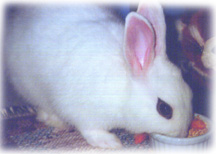
PROPER NUTRITION

Although all brands of rabbit pellets may look the same, you really need to look at the crude fiber content to know just what you're getting. Any pellet with less than 16% crude fiber is a poor quality rabbit pellet. High quality pellets should have between 18%-24% crude fiber.
Watching your rabbit's food consumption is a good idea. Giving half a cup to one cup a day, depending on the size of your rabbit (see chart below). Keep away from too many fatty foods such as gourmet rabbit foods that can cause obesity. Obesity can cause liver damage and intestinal disease.
As early as three months of
age you can start offering your rabbit hay. An unlimited supply
of hay provides essential fiber as well as protien, vitamins,
minerals and carbohydrates. The most nutritional are timothy hay
and oat hay, alfalfa hay may also be offered. Rabbits require a
large amount of fiber in their diets to maintain normal
gastrointestinal movement. The high fiber content of hay makes
the best preventative for stomach and intestinal problems such as
hairballs and chronic soft stool.
At six months of age you
can start to introduce your rabbit to leafy greens. Fresh leafy
greens are an important part of a rabbit's diet. Give little bits
slowly, so it will not cause soft stool. Greens such as Romaine
lettuce, parsley, dill, kale and carrot tops are good choices.
Once or twice a week give bananas, carrots and apples as a treat.
Don't give your rabbit iceberg lettuce. It has almost no
nutritional value, its basically all water and will probably
cause diarrhea.
To further prevent hairballs, give your bunny some fresh pineapple juice (unpasturized) and some papaya enzyme tablets. The enzymes help to digest protiens such as hair which are normally hard to digest. These are available from the health food store or in the vitamin department of your local drug store. One tablet a day is enough, and they taste great!
Copyright ©1996-1999 Some Bunny Loves You...
All rights reserved.